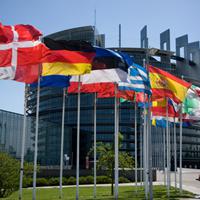

Harmonisation
Harmonisation is a key concept in the European Union for making identical rules in still more areas of governance.
Under the founding Treaty of Rome harmonisation of national laws required unanimity.
The Single European Act from 1987 introduced qualified majority voting for most harmonisation in the Internal Market.
The treaties of Maastricht, Amsterdam and Nice extended areas for majority decisions.
From 2009 the Lisbon Treaty introduced the possibility of a qualified majority harmonising EU law also in sensitive political areas.
In the most sensitive areas, so-called, 'bridges' or 'passerelles' now allow the EU to introduce the use of qualified majority voting if this is agreed upon unanimously by the European Council, without the need for new Treaties or referendums.
However there are areas like culture and education within the sphere of supporting, coordinating and complementary action where Union legal acts may not entail harmonisation of national laws - see Art. 6 TFEU in the Lisbon Treaty.
Important harmonisation has been established by radical verdicts from the EU Court.
A revolutionary verdict was established in the so-called Cassis de Dijon case in 1979. The Court obliged member states to accept most standards from other EU countries. This forced the member states to accept compromises on harmonisation to avoid the lowest standard to be the general law.
When the EU harmonise in areas as consumer protection, the environment, labour law, social standards the treaties set a requirement for minimum standards, which ideally would allow member states to have stricter rules on their own.
The Commission and the EU Court does not like the different standards and often intervene against member states setting their own higher or stricter standards.
Today the EU is also setting the standards for neighbour countries in the EEA and many international standards.
Many international standards from Standard organisations become EU law with supremacy over national law when the EU enters into an international agreement.
See also Number of EU rules, Environmental clause, Supporting action and Voting in the Council
Note
Article 6 TFEU does not allow harmonisation of national laws in the mentioned areas:
"The Union shall have competence to carry out actions
to support, coordinate or supplement the actions of the
Member States. The areas of such action shall, at European
level, be:
(a) protection and improvement of human health;
(b) industry;
(c) culture;
(d) tourism;
(e) education, youth, sport and vocational training;
(f) civil protection;
(g) administrative cooperation."